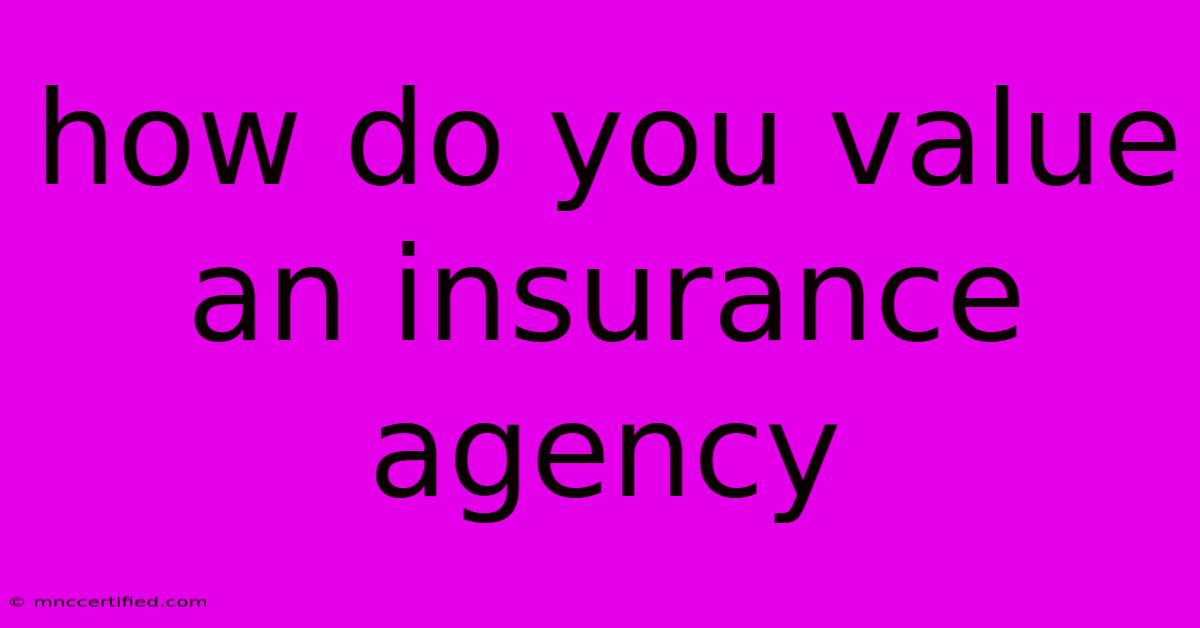How Do You Value An Insurance Agency

Table of Contents
How to Value an Insurance Agency: A Comprehensive Guide
Acquiring an insurance agency can be a lucrative investment, but it's crucial to understand the valuation process to ensure a fair deal. There's no one-size-fits-all formula, as agency value is influenced by numerous factors. This guide outlines the key elements and methods used to determine the worth of an insurance agency.
1. Understanding Key Valuation Metrics
Before diving into the methods, it's essential to grasp the core metrics influencing agency value. These include:
- Revenue: The agency's total annual premium income is a primary indicator of its size and potential.
- Profitability: Examining net income after expenses reveals the agency's financial health and ability to generate profit.
- Growth: A history of consistent revenue and profitability growth signals a successful and scalable business.
- Client Base: The quality and loyalty of the agency's client base are crucial, as satisfied customers drive long-term revenue.
- Staff Expertise: A skilled and experienced team ensures smooth operations and client satisfaction.
2. Common Valuation Methods
Several methods are employed to estimate an insurance agency's value. Here are some popular approaches:
a) Multiple of Revenue (MOR):
This method is a simple and commonly used approach. It involves multiplying the agency's annual revenue by a specific multiple, typically ranging from 0.5 to 2.5. The multiple is adjusted based on factors like profitability, growth rate, and market conditions.
Example: An agency with $1 million in annual revenue might be valued between $500,000 and $2.5 million based on the chosen multiple.
b) Multiple of Profit (MOP):
Similar to the MOR, this method uses a multiple applied to the agency's net income. The multiple typically ranges from 5 to 15, reflecting the risk and expected return on investment.
Example: An agency with a net income of $200,000 could be valued between $1 million and $3 million based on the chosen multiple.
c) Discounted Cash Flow (DCF):
This method projects the agency's future cash flows and discounts them back to their present value using a discount rate that reflects the risk associated with the investment. It offers a more sophisticated and comprehensive approach to valuation.
Example: A DCF analysis might project the agency's future net income for the next five years, discount these cash flows back to the present, and arrive at a value based on these projections.
d) Market Comparable Analysis:
This method compares the agency's key metrics to similar agencies that have been recently sold or acquired. It provides insights into market values for comparable businesses.
Example: Examining recent transactions of insurance agencies with similar revenue, profitability, and client bases can help determine a fair valuation range.
3. Factors Influencing Valuation
Several factors beyond the core metrics can significantly impact an insurance agency's value:
- Market Dynamics: Competition, insurance market trends, and economic conditions can affect an agency's attractiveness.
- Book of Business: The composition of the client base, including demographics, policy types, and risk profiles, plays a role.
- Technology and Infrastructure: Modern systems, digital platforms, and operational efficiency contribute to higher value.
- Reputation and Brand: A strong reputation and established brand in the community add value to the agency.
- Legal and Regulatory Compliance: A solid track record of compliance with industry regulations ensures a smooth transition for the buyer.
4. Seeking Professional Expertise
While the above methods provide a framework, seeking professional advice from experienced insurance agency brokers or valuation specialists is highly recommended. They can offer customized valuation reports, identify potential risks and opportunities, and guide you through the negotiation process.
Conclusion
Valuing an insurance agency requires a comprehensive approach that considers multiple factors. Understanding key metrics, exploring different valuation methods, and engaging professional expertise are crucial to ensure a fair and informed decision-making process. By carefully analyzing these aspects, potential buyers can make confident and successful acquisitions in the insurance agency market.

Thank you for visiting our website wich cover about How Do You Value An Insurance Agency. We hope the information provided has been useful to you. Feel free to contact us if you have any questions or need further assistance. See you next time and dont miss to bookmark.
Featured Posts
-
2024 Nfl Patriots Vs Bears Odds Start Time Picks
Nov 11, 2024
-
Commercial Insurance Jacksonville Fl
Nov 11, 2024
-
Breast Pump Through Insurance Anthem
Nov 11, 2024
-
Week 10 Inactives Vikings At Jaguars
Nov 11, 2024
-
Watch Chelsea Vs Arsenal Premier League Livestream
Nov 11, 2024